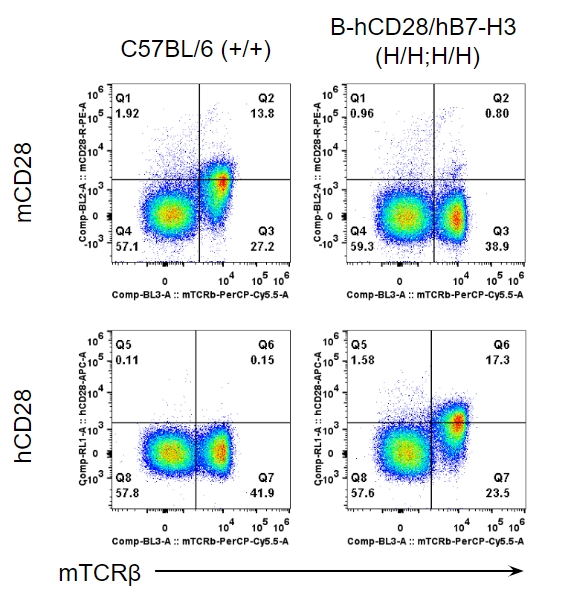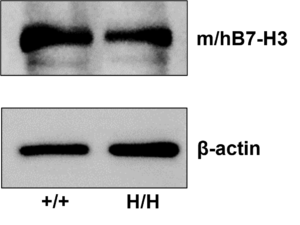Basic Information
-
Gene Targeting Strategy

-
Exons 2-3 of the murine Cd28 gene, which encodes the extracellular domain, were replaced by exons 2-3 of the human CD28 gene in B-hCD28/hB7-H3 mice. Exons 3~4 of the murine Cd276 gene, which encodes the extracellular domain, were replaced by exons 3~6 of the human CD276 gene in B-hCD28/hB7-H3 mice.
-
Protein Expression Analysis

-

Strain specific CD28 expression analysis in homozygous B-hCD28/hB7-H3 mice by flow cytometry.
Splenocytes were collected from wild type (WT) mice (+/+) and homozygous B-hCD28/hB7-H3 mice (H/H;H/H), and analyzed by flow cytometry with species-specific anti-CD28 antibody. Mouse CD28 was detectable in WT mice (+/+). Human CD28 was exclusively detectable in homozygous B-hCD28/hB7-H3 mice (H/H;H/H) but not in WT mice (+/+).

Species-specific B7-H3 expression analysis in double humanized B-hCD28/hB7-H3 mice. Epididymis was collected from wild-type C57BL/6 (+/+) and homozygous B-hCD28/hB7-H3 (H/H) mice and analyzed by western blot using anti-B7-H3 antibodies. B7-H3 was detected in wild-type and B-hCD28/hB7-H3 mice due to the cross-reactivity of the antibodies.
-
Summary

-
Protein expression analysis:
Human CD28 was exclusively detectable on T cells of homozygous B-hCD28/hB7-H3 mice (H/H;H/H) but not in WT mice (+/+), and mouse CD28/hB7-H3 was detectable only in WT mice (+/+).
B7-H3 was detectable in WT mice (+/+) and homozygous B-hCD28/hB7-H3 mice (H/H;H/H) due to the cross-reactivity of antibodies.


